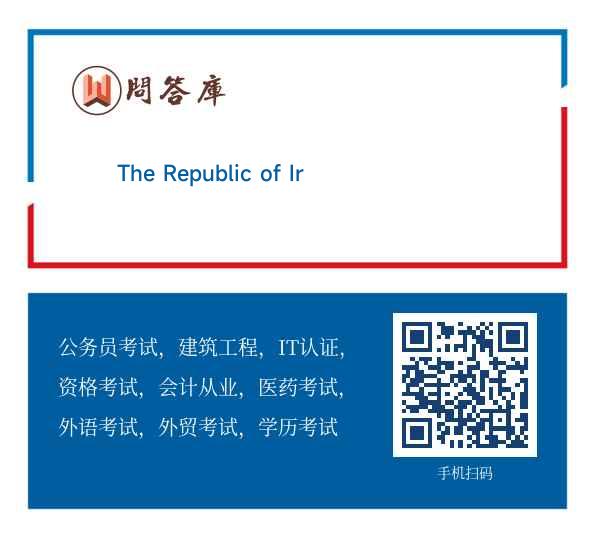The Republic of Ireland is a sovereign state i
问题详情
The Republic of Ireland is a sovereign state in Western Europe, occupying about five-sixths of the island of Ireland. The capital and largest city is Dublin, whose metropolitan area is home to around a third of the country’s 4.6 million inhabitants. The state shares its only land border with Northern Ireland. It is a unitary, parliamentary republic with an elected president serving as head of state. The head of government is nominated by the lower house of parliament.
Following the Irish War of Independence and the subsequent Anglo-Irish Treaty, Ireland gained independence from the United Kingdom in 1922. Initially a dominion, Ireland received official British recognition of full legislative independence in the Statute of Westminster of 1931. A new constitution was adopted in 1937, by which the name of the state became “Ireland.” In 1949, Ireland was declared a republic under the Republic of Ireland act 1948.
Ireland ranks among the wealthiest countries in the world in terms of GDP per capita. In 1973, Ireland enacted a series of liberal economic policies that resulted in rapid economic growth, coupled with a dramatic rise in inequality. The country achieved considerable prosperity from 1995 to 2007. This was halted by an unprecedented financial crisis that began in 2008, in conjunction with the concurrent global economic crash.
In 2011 and 2013 Ireland was ranked as the seventh-most developed country in the world by the United Nations Human Development Index. It also performs well in several metrics of national performance, including freedom of the press, economic freedom and civil liberties. It pursues a policy of neutrality through non-alignment.
The population of Ireland stood at 4,588,252 in 2011, an increase of 8.2 percent since 2006. As of 2011, Ireland had the highest birth rate in the European Union (16 births per 1,000 of population). In 2012, 35.1 percent of births were to unmarried women. Annual population growth rates exceeded 2 percent during the 2002-2006 period, which was attributed to high rates of natural increase and immigration. This rate declined somewhat during the subsequent 2006-2011 period, with an average growth rate of 1.6 percent.
Ireland ranks fifth in the world in terms of gender equality. In 2011, Ireland was ranked the most charitable country in Europe, and second most charitable in the world. Contraception was controlled in Ireland until 1979, however, the receding influence of the Catholic Church has led to an increasingly secularized society . In 1983, the Eighth Amendment recognized “the right to life of the unborn”, subject to qualifications concerning the “equal right to life” of the mother. The passage of the Thirteenth and Fourteenth Amendments guarantees the right to have an abortion performed abroad, and the right to learn about “services” that are illegal in Ireland, but legal abroad. The prohibition on divorce in the 1937 Constitution was repealed in 1995 under the Fifteenth Amendment. Divorce rates in Ireland are very low compared to European Union averages while the marriage rate in Ireland is slightly above the European Union average.
Capital punishment is constitutionally banned in Ireland, while discrimination based on age, gender, sexual orientation, marital or familial status, religion and race is illegal.
Ireland became the first country in the world to introduce an environmental levy for plastic shopping bags in 2002 and a public smoking ban in 2004. Recycling in Ireland is carried out extensively and Ireland has the second highest rate of packaging recycling in the European Union.请帮忙给出正确答案和分析,谢谢!
参考答案
正确答案:
译文:
爱尔兰共和国是西欧的一个主权国家,其国土面积为爱尔兰岛的六分之五。爱尔兰的首都和最大城市是都柏林,该国460万人口中约三分之一居住在这座大都市。唯一与爱尔兰在陆地上接壤的是英国的北爱尔兰。爱尔兰是中央集权的议会制共和国,总统为国家元首,由选举产生。爱尔兰总理由议会下议院选出。
在爱尔兰独立战争和随后签署的《英爱条约》之后,爱尔兰于1922年脱离联合王国获得独立。独立之初的爱尔兰只是一块(仍受应该控制的)自治领,在1931英国议会通过《威斯敏斯特条例》后,爱尔兰才获得英国对其立法独立的正式承认。1937年爱尔兰实施了一部新宪法,这部宪法规定该国的名称为“爱尔兰”。在1949年,《爱尔兰共和国法案1948》获得通过,爱尔兰宣布成为一个共和国。
以人均GDP计算,爱尔兰位居世界最富裕国家行列。1973年,爱尔兰通过了一系列自由经济政策,这促进了经济的快速增长,同时社会不平等问题加剧。1995年到2007年,该国经济欣欣向荣。但其经济良好态势被2008年爆发的史无前例的金融危机所中断,与此同时全球经济也遭受重挫。
在2011年和2013年的《联合国人类发展指数报告》中,爱尔兰位列最发达国家第七位。并且该国在国家发展的其他几个指标方面表现突出,包括媒体自由、经济自由和公民自由方面。该国奉行不结盟的中立外交政策。
2011年,爱尔兰人口为4588252人,自2006年来增加了8.2%。截止2011年,爱尔兰的出生率为欧盟最高(每千人每年出生16名婴儿)。2012年,爱尔兰35.1%的新生儿为未婚女性所生。在2002年到2006年这个阶段,爱尔兰每年人口增长率超过2%,这归功于较高速度的自然人口增长和移民。这个增长率在随后的2006年到2011年这个阶段稍微下降,此阶段的人口年增长率为1.6%。
在性别平等方面,爱尔兰排名世界第五。在2011年,爱尔兰被评为欧洲最慈善国家第一名,世界最慈善国家第二名。在1979年以前,避孕措施在爱尔兰是受到管制的,但罗马天主教影响力的消退导致了爱尔兰社会越来越世俗化。1983年,第八修正案承认了“未出生的婴儿的生命权”,其所具有的生命权资格与其妈妈的生命权资格是平等的。第十三和第十四修正案的通过确保了女性有在国外堕胎的权利以及学习“堕胎服务”的权利,这种服务在爱尔兰是违法的,但在国外是合法的。1937年宪法禁止离婚的规定在1995年通过的第十五修正案中被废止了。与欧盟平均水平相比,爱尔兰的离婚率十分的低,而爱尔兰的结婚率则稍稍高于欧盟平均水平。
爱尔兰宪法禁止死刑,同时规定基于年龄、性别、性取向、婚姻或家庭状况、宗教和种族方面的歧视是违法的。
爱尔兰在2002年开始对塑料购物袋开征环境税,2004年开始在公共场所禁烟,而这些举措在世界上均属首创。资源循环利用在爱尔兰开展的很广泛,爱尔兰的包装循环利用率在欧盟位居第二。
评析:
2015年11月英语三级笔译英译汉第一篇来自维基百科“爱尔兰”词条,本文介绍的是爱尔兰国家的概况,主要包括爱尔兰的独立历史、经济现状、人口出生率等几个方面,内容比较零散。全文共8段580词,符合三级笔译大纲英译汉文章单词余约600词的要求,本文的难度不大。较有难度的地方主要包括以下几个方面。这些主要是涉及到爱尔兰的历史、宗教以及爱尔兰和英国的关系,需要考生有一定的政治常识。
第一段中的“It is a unitary, parliamentary republic with an elected presidentserving as head ofstate”这句应该翻译为“中央集权的议会制共和国”,“unitary”为“中央集权的”,而不是“单一的”。在其后的“the head ofgovernment”应该翻译为“总理”,而非“政府首脑”。爱尔兰的总统和总理的职权是不同的。
第二段中的“Initially a dominion, Ireland received official British recognition offull legislative independence in the Statute of Westminster of1931”这句应翻译难度比较大。首先要明白“dominion”的意思以及“Statute of Westminster of1931”这部法律。“dominion”的意思是“A dominion is an area of land that is controlled by aruler”,自治领是英国殖民地制度下一个特殊的国家体制,这些自治领是自治国家,但是没有立法权。另外“Statute of Westminster of1931”指的是1931年英国议会通过的“威斯敏斯特条例”。它是关于处理英联邦内部关系的重要法律。它赋予加拿大、澳大利亚、南非、爱尔兰等前英国殖民地以完全的立法权。
第七段中“the receding influence of the CatholicChurch”比较难理解,这里的背景是,罗马天主教一直是爱尔兰的主要宗教,信奉天主教人口达到90%,但由于基督教在爱尔兰的传播,天主教的影响力正逐渐下降。
